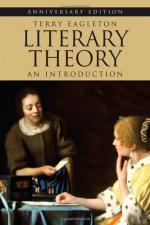
|
| Name: _________________________ | Period: ___________________ |
This test consists of 15 multiple choice questions and 5 short answer questions.
Multiple Choice Questions
1. According to Eagleton, Stanley Fish's model excludes the possibility that there is a ______ of interpretations?
(a) Acceptance.
(b) Rejection.
(c) Dominance.
(d) Struggle.
2. The German philosopher Edmund Husserl argued that objects can be regarded as things ______ by consciousness.
(a) Understood.
(b) Evaluated.
(c) Realized.
(d) Intended.
3. For Eagleton, E.D. Hirsch attempts to "offer a form of knowledge" that is what?
(a) Telling.
(b) Timeless.
(c) Temporary.
(d) Titular.
4. For Eagleton, hostility toward theory means what?
(a) Acceptance to some people's theories.
(b) Acceptance to some people's theories and protective of one's own.
(c) Opposition to other people's theories and oblivion of one's own.
(d) Opposition to other people's theories.
5. For E.D. Hirsch, the aim of "policing" an author's meaning is to what, according to Eagleton?
(a) Protect her/his "private property."
(b) Control her/his "private property."
(c) Sell her/his "private property."
(d) Alter her/his "private property."
6. What date does Eagleton settle on as the "beginnings of the transformation which has taken over literary theory in this century"?
(a) 1917.
(b) 1977.
(c) 1937.
(d) 1957.
7. For Eagleton, how did the romantics usher a "forestalling of reasoned critical enquiry"?
(a) Because the symbol was regarded as an absolute spiritual truth that you either saw or didn't see.
(b) Because the text was regarded as a reflection of society that you either saw or didn't see.
(c) Because the image was seen as material reality that you saw immediately.
(d) Because the word was seen as a refleciton of religious truths that you either saw or didn't see.
8. Eagleton provides the analogy of finding a "scrap of writing from a long-vanished civilization" to make what point about deciphering its meaning?
(a) That we would be able to tell that it was a piece of poetry regardless of access to its language.
(b) That we would be able to see that poetry didn't exist by looking at its language.
(c) That we would be able to learn that it was a piece of poetry by looking at the language.
(d) That we would not know whether it was a piece of poetry or ordinary language.
9. According to Eagleton, "if one were asked to provide a single explanation for the growth of English in the later nineteenth century" what would it be?
(a) The success of government.
(b) The failure of government."
(c) The failure of religion.
(d) The success of religion."
10. What proposes a "severe problem" for Husserl's theory?
(a) Individuality.
(b) Consciousness.
(c) Truth.
(d) Language.
11. How far has the "theoretical revolution" spread according to Eagleton?
(a) Not beyond the circle of specialists and enthusiasts.
(b) Far beyond the circle of specialists and enthusiasts.
(c) To the outer circle of critics and readers.
(d) Within the inner circle of critics and readers.
12. Who was glad to abandon the "feminine vagaries of literature" in favor of penning war propaganda?
(a) Walter Raleigh.
(b) Matthew Arnold.
(c) Lord Byron.
(d) George Gordon.
13. Eagleton's goal in "Literary Theory: An Introduction" is to provide a comprehensive account of literary theory for whom?
(a) Those with little knowledge of literary theory.
(b) Those who have specialised knowledge of literary theory.
(c) Those who have some knowledge of literary theory.
(d) Those with extensive knowledge of literary theory.
14. According to Eagleton, the approaches outlined in his book have implications where?
(a) Well beyond language.
(b) Well beyond literature.
(c) Well beyond politics.
(d) Well beyond feeling.
15. According to Eagleton, why is Hans-Georg Gadamer not concerned about bringing our cultural preconceptions to a literary work?
(a) Because like the literary work, they come from modernity.
(b) Because unlike the literary work, the come from tradition.
(c) Because unlike the literary work, they come from modernity.
(d) Because like the literary work, they come from tradition.
Short Answer Questions
1. According to Eagleton, what idea is "truly elitist" in literary studies?
2. For the economist Eagleton discusses, "those economists who dislike theory or claimed to get along better without it" were what?
3. According to Eagleton, eighteenth-century literature embodied more than social values, it also was an instrument for what?
4. Eagleton argues that reading literature in a new critical way was a recipe for what?
5. What is the name of the critic from the Constance school of reception aesthetics and the author of "The Act of Reading" who Eagleton discusses at length?
|
This section contains 771 words (approx. 3 pages at 300 words per page) |

|




